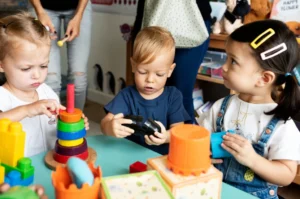Social development is a critical aspect of a child’s early years, shaping their ability to form healthy relationships and interact with others throughout life. Babies and toddlers begin building their social skills from birth, and caregivers play a crucial role in fostering their social development. In this guide, we explore the stages of social development in babies and toddlers and offer strategies to support the building of healthy relationships.

- Attachment and Bonding (Birth to 6 Months):
- Foster a secure attachment by responding promptly to your baby’s needs for comfort, feeding, and affection.
- Engage in eye contact, gentle touch, and soothing voices to create a strong emotional bond with your baby.
- Encourage interactions with close family members and caregivers to help babies form trusting relationships.
- Developing Social Smiles (6 to 12 Months):
- Celebrate and respond to your baby’s social smiles and expressions, reinforcing positive interactions.
- Offer opportunities for play with other babies in a safe and supervised environment to promote social exploration.
- Model social interactions and emotional expressions for your baby to imitate and learn from.
- Stranger Anxiety (8 to 12 Months):
- Understand that stranger anxiety is a normal phase and reassure your baby when they feel anxious around unfamiliar faces.
- Gradually expose your baby to new people in a supportive and gentle manner to build confidence in social situations.
- Continue providing a secure base for your baby to return to when they feel overwhelmed.
- Parallel Play (1 to 2 Years):
- Encourage parallel play, where toddlers play alongside each other without direct interaction, promoting social awareness and comfort in the presence of others.
- Provide opportunities for playdates and group activities to expose toddlers to social interactions in a fun and engaging setting.
- Supervise play and intervene only when necessary to support positive interactions.
- Early Social Skills (2 to 3 Years):
- Support toddlers in expressing their emotions and needs verbally, helping them develop their communication skills.
- Teach simple social rules, such as taking turns and sharing, through gentle guidance and positive reinforcement.
- Model empathy and kindness towards others, showing toddlers how to treat their peers with respect and care.
- Cooperative Play (3 to 4 Years):
- Encourage cooperative play, where toddlers engage in activities together and share ideas and resources.
- Facilitate group activities that promote teamwork, problem-solving, and collaboration.
- Provide opportunities for imaginative play, where children can role-play and practice social skills.
- Building Empathy (4 to 5 Years):
- Help children recognize and understand others’ feelings and perspectives, fostering empathy and compassion.
- Read books or watch shows that highlight emotions and social situations, promoting discussions about empathy.
- Encourage children to engage in acts of kindness and caring towards others.
- Resolving Conflicts (5 Years and Older):
- Teach problem-solving strategies and conflict resolution skills, helping children navigate social challenges independently.
- Model effective communication and conflict resolution in your own interactions.
- Praise and acknowledge positive social behaviors, reinforcing prosocial actions.
Remember that every child develops at their own pace, and social development is a gradual and ongoing process. Providing a nurturing and supportive environment, along with consistent guidance, will help babies and toddlers build healthy relationships and develop strong social skills that lay the foundation for positive interactions throughout life. By actively supporting their social development, caregivers can empower children to thrive in social situations, form meaningful connections, and navigate the complexities of social interactions with confidence and empathy.









